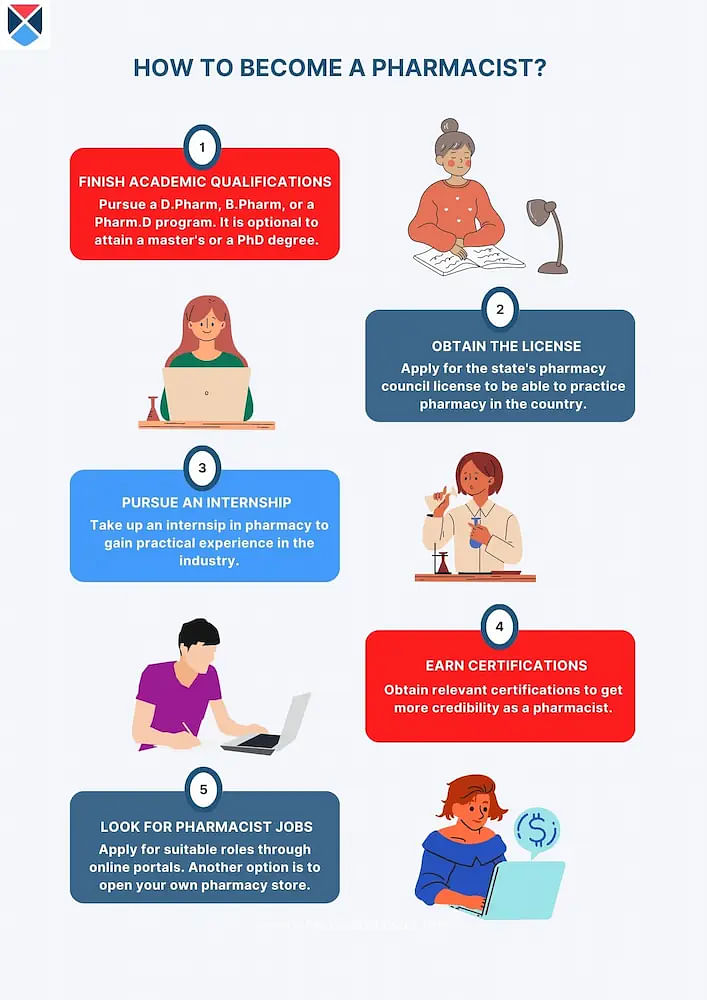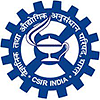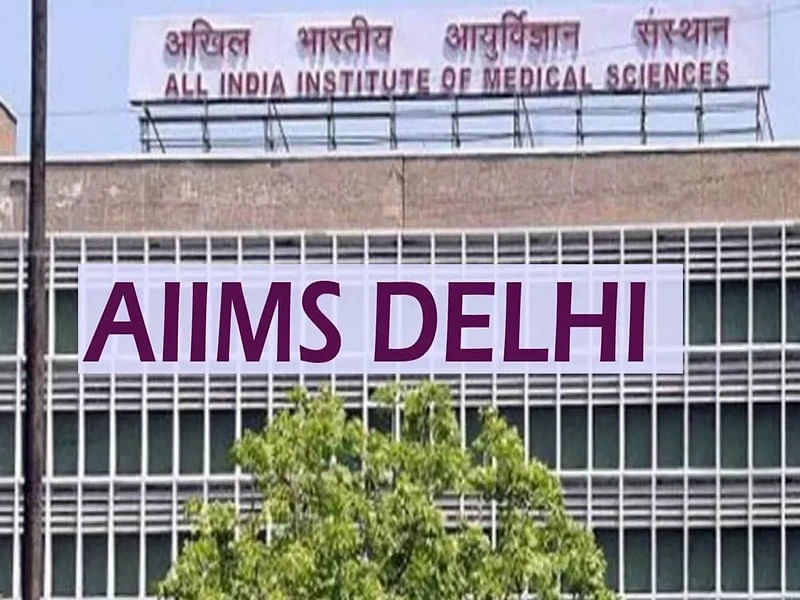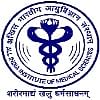Is being a Pharmacist your dream career option? Check out the complete step by step process on how to become a Pharmacist, Eligibility, Exams, Skills Required and Salary in 2023.
A pharmacist is a licensed healthcare expert who is responsible for supplying medications and guiding patients on their proper usage. The pharma industry in India is recession-proof and provides excellent career prospects for aspiring pharmacists. A recent report by EY FICCI shows that the Indian pharmaceutical market is projected to reach a value of $130 billion towards the end of 2030. On average, the pharmacist salary in India is INR 2,91,945 per year.
To become a pharmacist, aspirants must begin by obtaining the pharmacist qualifications. They should complete their 10+2 in the science stream and then pursue a B.Pharma, a D.Pharma, or a Pharm.D degree. Further, aspirants can opt for an MPharma program if they wish to gain extensive knowledge in a particular field. Most importantly, candidates must apply for the state pharmacy council license to practice Pharmacy in India.
Table of Contents
- How to Become a Pharmacist in India?
- Who is a Pharmacist?
- What does a Pharmacist do?
- Qualifications Needed to be a Pharmacist
- Different Types of Pharmacists
- Pharmacist Salary in India
- Future Scope of Pharmacy in India
How to Become a Pharmacist in India?
The path to becoming a pharmacist begins with fulfilling the pharmacist education requirements. Aspirants must follow the below-mentioned process in order to pursue a career as a pharmacist.
- Step 1: Finish Academic Qualifications
- Step 2: Apply for the State Pharmacy Council License
- Step 3: Pursue an Internship
- Step 4: Obtain a Certification
- Step 5: Resume Building & Job Application

Step 1: Finish Academic Qualifications
First and foremost, candidates must complete the relevant pharmacist education qualifications. Here we have given the complete details concerning the pharmacist education required at different levels.
Clear 10+2
An aspiring candidate should pass his/her 10+2 in the science stream with a minimum of 50-55% marks. Physics, chemistry, and maths are some of the subjects needed to become a pharmacist. Studying these subjects in class 12th will help aspirants satisfy the application requirements of UG pharmacy programs.
Also, Check: History of Pharmacy
Pursue Undergraduate Studies
Upon completion of 10+2, candidates can now study pharmacist courses in college. There are many pharmacy courses after 12th science that a candidate can pursue. They can opt for a D.Pharm, a B.Pharm, or a Pharm.D course at the undergraduate level. However, it is required to crack the required pharmacist exams to qualify for admission into the top pharmacy institutes.
Diploma in Pharmacy (D.Pharm)
The minimum education required to become a pharmacist is to complete a diploma in pharmacy as per the guidelines set by the Pharmacy Council of India. Therefore, candidates must have a D.Pharm degree if they want to open their drug store or pharmacy.
The average course fee of this 2-year program ranges between INR 40,000-1,00,000 per year. To get admission to top D.Pharm colleges, one must clear entrance exams like BITSAT, MET, KCET, TS EAMCET, GUJCET, MH CET, etc. Candidates can choose to pursue a diploma in one of the following areas:
- Pharmacy
- Ayurvedic Pharmacy
- Pharmaceutical Marketing
- Drug Store Management
Read More: D.Pharm
Bachelor of Pharmacy (B.Pharm)
Most of the leading pharmaceutical companies prefer hiring pharmacists who hold a bachelor’s degree in pharmacy. The B.Pharm program has a 4-year duration, and the course fee is around INR 60,000-3,00,000. To gain entry into the best B.Pharm institutes, candidates must qualify for entrance tests such as OJEE, NPAT, NIPER JEE, LPUNEST, etc. Aspirants can earn this degree in any of the below-mentioned fields:
- Pharmacy
- Pharmaceutical Chemistry
- Pharmacognosy
- Ayurvedic Pharmacy
- Pharmaceutics
Read More: B.Pharm
Doctor of Pharmacy (Pharm.D)
Pharm.D is a 6-year program that students can take up directly after 10+2. The curriculum of the course involves 5 years of theoretical studies and 1 year of internship training. Also, those pursuing the BPharm program have the option to get lateral entry to the 4th year of this course on a merit basis. The age limit for pharmacists to pursue this course is between 17-23 years.
The Pharm.D program fee can range anywhere between INR 2,00,000-9,00,000. Moreover, it is compulsory for candidates to have valid entrance test scores to apply to top Pharm.D colleges. Top Pharm.D entrance exams include NIMSEE, BV CET, MET, etc.
Read More: Pharm.D
Opt for Higher Education
Once aspiring pharmacists have completed their undergraduate studies, they have 2 options. They can either apply for entry-level pharmacist jobs or go for higher studies. More details are discussed below.
Master of Pharmacy (MPharm)
A candidate who completes a B.Pharm program from a known university with at least 55% marks is eligible to apply for the MPharm program. Pursuing a master’s course in pharmacy is a suitable option for candidates who wish to specialise in a specific pharmacy field. One of the following specialisations can be chosen by the candidate.
- Pharmaceutics
- Pharmaceutical Analysis
- Pharmacology
- Pharmaceutical Chemistry
- Regulatory Affairs
- Quality Assurance
- Pharmaceutical Biotechnology
- Pharmacy Practice
- Industrial Pharmacy
- Pharmacognosy
The master’s program in pharmacy lasts for 2 years and entails a course fee of INR 30,000-2,00,000 per annum. Admission to this program in top MPharm colleges commonly takes place through exams like GPAT, AP PGECET, TS PGECET, BITS HD, etc.
Read More: MPharm
PhD in Pharmacy
Those who want to pursue research can also attain a doctorate degree in pharmacy after completing the master’s program. The minimum requirement to gain admission to this program is a master’s pharmacy degree. Moreover, candidates must have secured at least 55% marks.
The duration of a doctorate program in pharmacy is 3-5 years, and it can cost around INR 50,000 to INR 4,00,000 to pursue this course. The major entrance exams for admission to this course include NIPER JEE, UGC NET, SET, CSIR NET, etc. Further, candidates need to appear for an interview to get shortlisted.
Read More: PhD Pharmacy
Step 2: Apply for the State Pharmacy Council License
Now that candidates have understood what degree is required to become a pharmacist let us move to the most important step. To be able to practice pharmacy in India, candidates need to apply for a state license. The minimum eligibility requirement to apply for this license is the completion of a diploma degree in pharmacy or an equivalent qualification. This requirement is according to the guidelines established by the Pharmacy Council of India (PCI).
Candidates must check the official website of their respective states’ pharmacy council to know the documents required for pharmacist registration and other requirements.
Step 3: Pursue an Internship
An internship in the field of pharmacy shall assist candidates in acquiring relevant industry experience. It will not only help them become familiar with the latest practices but will also make them better equipped to apply for suitable pharmacist jobs. Most of the pharmacist programs at the undergraduate level include internships in their course curriculum.
Step 4: Obtain a Certification
It is optional to obtain a certification in pharmacy; however, it can aid aspiring pharmacists in improving their skills and gaining more knowledge. Listed below are a few of the top certifications in pharmacy that can be taken by an aspirant:
|
Course Name |
Provider |
Duration |
Course Fee (INR) |
|
Certificate in Pharmacy Assistant (CPA) |
National Council of Training Academy |
6 Months |
INR 8,000 |
|
Become a Pharmacy Technician |
Udemy |
4 Hours 55 Minutes |
INR 649 |
|
Essentials of Good Pharmacy Practice |
Taipei Medical University- FutureLearn |
3 Weeks |
INR 550 |
|
Industry Certificate in Pharmaceutical Sales and Marketing Management |
IGMPI |
3 Months |
INR 32500 |
|
Pharmacy for Beginners |
Universiti Malaya- FutureLearn |
3 Weeks |
INR 770 |
Also, Check:
| Pharmacy Courses after 10th | Pharmacy Courses after 12th |
Step 5: Resume Building & Job Application
Lastly, candidates must polish their resume with all the necessary qualifications, experiences, and skills and begin their job hunt. They can check out the employment portals online to look for pharmacist recruitment opportunities. Candidates can work in various settings as pharmacists, including hospitals, clinics, retail stores, nursing homes, etc. Alternatively, they can choose to pursue private practice & set up their own pharmacy store.
| How to Explain Project in an Interview? | Tips on How to Introduce Yourself in an Interview |
Who is a Pharmacist?
A healthcare professional who dispenses medications prescribed by the physician and educates patients on the appropriate use of medicines is a pharmacist. The pharmacist's duties also involve examining the safety level of freshly manufactured drugs and providing over-the-counter medicines. Pharmacists can work in hospitals, retail drug stores, nursing homes, local pharmacies, government drug research institutes, etc.
What does a Pharmacist do?
The role of pharmacists in public health is to counsel patients on the suitable type of medicines, their dosage, and prevention measures. These experts possess complete knowledge of the drug composition, their uses and side effects. Mentioned below are the major pharmacist responsibilities.
- Supplying medicines to patients, including pills, syrups, ointments, injections, etc.
- Verifying the accuracy of the prescription
- Educating patients on the possible side effects of the medications
- Furnishing the vaccinations requested by the patients
- Assessing whether the prescribed medicines will interact with the past medications taken by the patient
- Monitoring the drugs supply chain to ensure adequate stock
- Providing education to both patients and staff on different drug therapies
- Ensuring adherence to regulations established by central and state government
Also, Read on 5 Key Steps for Career Planning and Development
How Many Years to Be a Pharmacist?
It can take somewhere between 5-6 years for candidates to become a pharmacist. However, it depends on which program the candidate has opted for at various levels. For instance, a diploma in pharmacy takes 2 years to complete, while a B.Pharm degree lasts for 4 years. Further, a master’s program in pharmacy has a duration of 2 years, and a PhD in the same field is a 3-5 year program.
Qualifications Needed to be a Pharmacist
It is important for aspirants to meet the set eligibility to become a pharmacist in India. The minimum pharmacist qualification is a diploma degree in pharmacy. Below we have discussed the course-wise pharmacist requirements.
- Clear 10+2 in the science stream with 50-55% marks for admission to D.Pharm, B.Pharm courses, and Pharm.D courses. Additionally, the age of the candidate to pursue a Pharm.D course must be between 17-23 years.
- Get a bachelor’s degree in pharmacy from a reputed institution with at least 55% marks for entry into the M.Pharm program.
- A master’s degree in pharmacy is required for admission to PhD in Pharmacy. Moreover, the candidate should have obtained a minimum of 55% marks.
Candidates also need to crack various entrance exams to secure admission into one of the reputed pharmacy colleges. Here is the course-wise list of entrance exams:
|
Course |
Entrance Exams |
|
D.Pharm |
BITSAT, MET, KCET, GUJCET, MH CET |
|
B.Pharm |
OJEE, NPAT, NIPER JEE, LPUNEST |
|
Pharm.D |
NIMSEE, BV CET, MET |
|
M.Pharm |
GPAT, AP PGECET, TS PGECET, BITS HD |
|
PhD in Pharmacy |
NIPER JEE, UGC NET, SET, CSIR NET |
Read More: Top Pharmacy Entrance Exams in India
Top Colleges Offering Pharmacy Courses in India
According to NIRF Pharmacy Ranking 2023, the following are the top colleges that offer pharmaceutical programs at different degree levels.
|
NIRF Rank |
College Name |
|
1 |
|
|
2 |
|
|
3 |
|
|
4 |
|
|
5 |
|
|
6 |
|
|
7 |
|
|
8 |
|
|
9 |
|
|
10 |
Read More: Top 50 NIRF Pharmacy Ranking 2023 Colleges in India
Different Types of Pharmacists
Based on the pharmacist's roles and responsibilities and the sector in which they work, there are various kinds of pharmacists in India.
- Clinical Pharmacists: Such pharmacists work in hospital settings like clinics and nursing homes. Their role is to recommend meditations to patients and monitor the dosage and delivery timing of the medications.
- Consultant Pharmacists: Their role is to provide expert advice on clinical pharmacy, industrial pharmacy, public health pharmacy, etc., concerning the production of medicines & their safe usage.
- Community Pharmacists: They work in retail stores and provide guidance to patients on medications along with prescribing suitable medicines.
- Industrial Pharmacists: These pharmacists are involved in the development of drugs as per the safety regulations. Marketing, sales, research and development are a few fields where these pharmacists work.
- Drug Inspector: Drug inspectors assess the effectiveness and safety of medicines from the time of manufacturing until the sale.
- Nuclear Pharmacists: The job of a nuclear pharmacist is to develop, test, and supply radiopharmaceuticals or radioactive drugs.
Pharmacist Salary in India
The pharmacist's salary in India is around INR 2,91,945 PA. After gaining more expertise and relevant experience, a pharmacist can get high-paying jobs. Here are the experience-wise salary details for a pharmacist.
|
Level |
Experience (in years) |
Average Annual Salary (INR) |
|
Entry-level Pharmacist |
Less than 1 year |
INR 2,50,239 |
|
Early Career Pharmacist |
1-4 years |
INR 2,61,457 |
|
Mid-Career Pharmacist |
5-9 years |
INR 3,02,220 |
|
Experienced Pharmacist |
10-19 years |
INR 3,12,260 |
|
Late Career |
20+ years |
INR 3,91,074 |
Check out the job-profile-wise salary details to understand which type of pharmacist makes the most money:
|
Job Profile |
Average Annual Salary (INR) |
|
Clinical Pharmacists |
INR 3,60,745 |
|
Community Pharmacists |
INR 3,38,556 |
|
Industrial Pharmacists |
INR 2,80,000 |
|
Drug Inspector |
INR 4,99,608 |
|
Consultant Pharmacists |
INR 2,64,000 |
|
Nuclear Pharmacists |
INR 3,57,700 |
|
Retail Pharmacists |
INR 3,02,524 |
|
Hospital Pharmacists |
INR 2,98,821 |
Also, Check:
| Salary of a B Pharm Graduate in India | Salary of a Pharm.D Graduate in India |
| Salary of a D.Pharm Graduate in India | Salary of an M.Pharm Graduate in India |
Top Companies that Hire Pharmacists in India
There are several private and government pharmacist jobs available in India. Listed below are the top companies that offer employment opportunities to pharmacists across the country:
- Cipla
- Lupin
- Aurobindo Pharma
- Dr Reddy’s Laboratories
- Abbott India
- Piramal Enterprises
- Glenmark
- Cadila Health
- Alkem Lab
- Torrent Pharma
Benefits and Drawbacks of Being a Pharmacist
A career as a pharmacist can be rewarding; however, there are certain drawbacks to any career option. Take a look into the benefits and drawbacks of becoming a pharmacist.
Benefits of Being a Pharmacist
Let us find out what are the benefits of being a pharmacist through the points given below.
- The earning potential is good for candidates who pursue a pharmacist career. With relevant experience, a pharmacist can secure high-paying jobs.
- Since the pharmacist demand is high, there is job security in this field, especially in the government sector.
- Pharmacists also have the option to work remotely as they also involve themselves in a telepharmacy practice. It will aid them in creating a work-life balance.
- Candidates get the flexibility to take up private practice as a pharmacist by starting their own pharmacy store.
Drawbacks of Being a Pharmacist
Listed below are a few disadvantages of being a pharmacist:
- The education requirements are extensive in this field, and it can be challenging for aspirants to fulfil the requirements.
- The pharmacy industry offers an array of job opportunities; however, there is high competition involved for various posts.
- As pharmacists, candidates are required to keep standing on their feet for long working hours, which can be stressful.
What are the Key Skills of a Pharmacist?
The table below shows the key pharmacist skills that every aspiring candidate must possess:
|
Multi-tasking ability |
Attention to Detail |
|
Integrity |
Knowledge of Clinical Pharmaceutical |
|
Communication skills |
Mathematical Skills |
|
Computer Skills |
Analytical Skills |
|
Supervisory Skills |
Managerial Skills |
Best Reference Books to Become a Pharmacist
Candidates can study from any of the following pharmacist exam books to prepare effectively for various pharmacist entrance exams.
|
Book Name |
Author |
|
Theory and Practice of Industrial Pharmacy |
Lieberman & Lachman |
|
Advanced Entrance Guide For Pharmacist Exam |
Birla |
|
Physical Pharmaceutics |
CVS Subrahmaniam |
|
Pharmaceutical Engineering |
CVS Subrahmanyam |
|
Essentials of Medical Pharmacology |
KD Tripathi |
|
Drug store management |
Mehta |
Future Scope of Pharmacy in India
It is anticipated that the pharma Industry of India will reach the value of $130 billion by 2030. This clearly indicates that the demand for skilled pharmacists will continue to grow in the near future. Therefore, pursuing a career as a pharmacist is a good choice as this profession holds excellent opportunities.
Moreover, the scope of being a pharmacist is not limited to delivering drugs. Candidates can find job opportunities as a pharmacist in the following areas:
- Retail Sector
- Hospitals
- Pharmaceutical sales and Marketing
- Drug Research and Development
- Clinics
- Medical Underwriting
- Quality Assurance
- Home Infusion and Chemotherapy
- Research and Development
- Pathological Labs














POST YOUR COMMENT